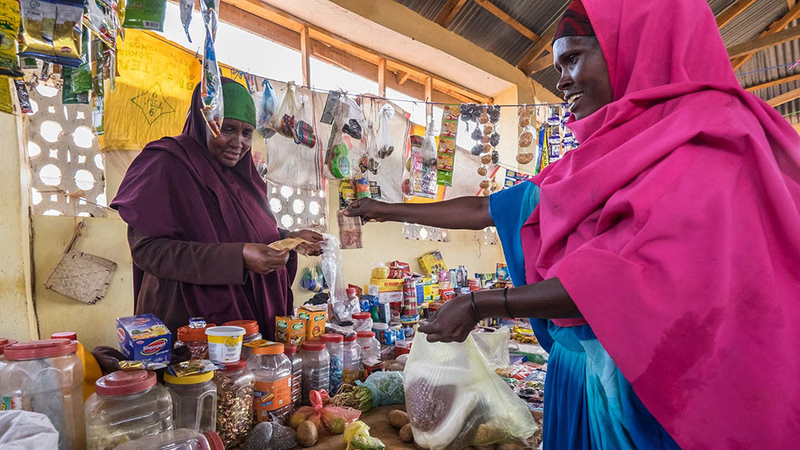
Somalia’s economy is largely based on agriculture, livestock, remittances, and a growing informal sector. Despite the challenges posed by decades of political instability, civil war, and limited infrastructure, Somalia has maintained a degree of resilience through informal trade networks and the support of its diaspora. Livestock, particularly cattle, sheep, and camels, forms the backbone of the economy, with the country being a major supplier of animals to the Middle East. Agriculture, especially the cultivation of bananas, sugarcane, and sorghum, is also a key sector, though it has faced challenges due to recurring droughts and lack of modern farming techniques.
Somalia’s financial system is largely underdeveloped and informal. There is no central banking system with full functionality, and much of the population relies on hawala networks for money transfers, particularly for remittances, which are vital for household income. These remittances make up a significant portion of the country`s GDP. Recently, there have been efforts to formalize and improve the financial sector, with institutions like the Central Bank of Somalia working to re-establish itself. Mobile money platforms have also gained popularity as a means of transferring and managing funds in a country where banking infrastructure remains limited.
In terms of trade, Somalia exports a large portion of its livestock to countries in the Middle East and West Asia, particularly Saudi Arabia, Oman, and the UAE. These countries rely on Somalia for their supply of animals, particularly during the Hajj season, when there is increased demand for livestock. Additionally, Somalia exports fish, charcoal, and agricultural products. On the import side, Somalia relies heavily on foreign goods, with significant imports of food products, machinery, fuel, and construction materials from the Gulf States and other countries in the Middle East. The trading relationships are heavily dependent on maritime routes, given Somalia`s strategic location along the Horn of Africa and its access to the Indian Ocean.
While the Somali economy faces numerous challenges such as insecurity, corruption, and lack of infrastructure, there are also opportunities for growth, particularly in sectors like telecommunications, trade, and fisheries. The engagement of the Somali diaspora and international partners continues to play a crucial role in shaping the country’s economic future.
-
 Minutes Dibad 3 months ago
Minutes Dibad 3 months ago Somalia
Gemstones
Somalia
Gemstones
I HAVE A GOLD SAND EVERY BODY WHO WANTS IT CAN CONTACT ME WITH +252618831779Details
-
 Fahad Siciid Xasan 3 months ago
Fahad Siciid Xasan 3 months ago Somalia
Ethiopian black opal
Somalia
Ethiopian black opal
A large quantity of original opal stones from Ethiopia 1kg+Details
In a striking rebound, Somalia"s GDP rose from $9. 48 billion in 2021 to $10. 97 billion in 2023, indicating a steady economic recovery compared to a global average GDP of approximately $883. 7 billion in 2023. This growth trajectory places Somalia as a key player in East African trade, emphasizing its resilience amidst global economic challenges. Somalia"s merchandise import value index exhibited volatility, peaking at 116. 5 in 2022, compared to a global average of 118. 57, before normalizing to 97.
3 in 2023, below the global threshold of 101. 09. This trend suggests a potential opportunity for businesses to tap into import substitution strategies by identifying local production capabilities. Meanwhile, the merchandise export value index surged to 170. 2 in 2022, significantly outperforming the global average of 117. 99, before settling at 115. 7 in 2023. This highlights potential export opportunities, particularly in raw materials and agricultural products, aligning with the region"s strengths.
Somalia"s merchandise import volume index, at 95. 0 in 2023, contrasts with the global average of 104. 48, indicating less import activity and suggesting untapped market potential for international suppliers. On the export side, an export volume index of 111. 5 in 2023 surpasses the global rate of 108. 41, reflecting renewed interest in Somali goods on the international stage. For businesses aiming to capitalize on these dynamics, platforms like Aritral. com offer strategic advantages.
By providing AI-powered marketing and global sales assistance, Aritral. com facilitates enhanced visibility and market insights, enabling traders to effectively navigate Somalia"s evolving trade environment. Entrepreneurs are encouraged to create a business profile on Aritral. com to leverage these opportunities and establish a foothold in the rapidly changing Somali market. "


